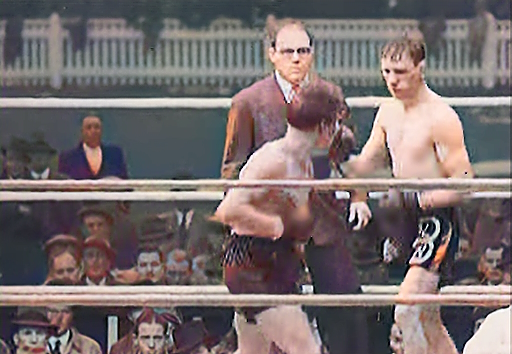UNSURPASSABLE
No, he’s not from Guadalajara.
From Skegness to Glasgow it is a career almost impossible to comprehend and that’s how I came to Len Wickwar, during a debate about who had the most professional boxing bouts. Thank you Google, I owe my life to you you own my life. How did one man fight 473 times? Here’s his story, it’s fascinating and today’s scene can learn much from it.
Born in 1911 and hailing from Leicester, competing from featherweight to (allegedly) welterweight, Len Wickwar officially fought four hundred and seventy three professional fights. His ledger takes an age to scroll on BoxRec and makes for interesting insight into an age where fighters with 0-6-0 records rocked up and won ten rounders. An era when punters just turned up to watch fights. No social media hype, no YouTube, just spit, sawdust and stick your dukes up.
Today's Small Hall supporters are the descendants of those everyday boxing fans, people who just want to see well matched combat. We’re just blinkered at every fan level into a zero losses means good fighter thought process.
Following a no contest with Tommy Cann in his debut on October 16th 1928, Wickwar stopped Jim Young Shepherson in the fourth of six, just a week later. Two weeks after that, whatever of a rematch there was to be had took place and Wickwar beat Cann on points over six. This habit of fighting every week or so is both astonishing and not surprising given his ultimate tally; the geezer had longevity and took a break during World War Two.
It was not uncommon for fighters to end their career with more than one or even two hundred fights back then, something which today’s comparatively paltry output is probably for the better in terms of looking after the long-term health of the athlete. Should today’s fighters care less about their ledger and fight more often with greater risk to their record? Yes, I believe they should. Even today’s world champions could up their workloads in terms of keeping fans happy and maintaining a “legacy”.
Len Wickwar began his career just before the Lonsdale Belt and British Boxing Board of Control existed. Back then “World” Champions were mostly American, an inward looking system the Americans invented and still apply unchallenged in some sports. Baseball has never gone truly global because it is a nonsensical, dull, imitation of cricket- an innately boring sport itself only the Commonwealth really waste time on.
The WBA predecessor was born in Massachusetts and called the National Boxing Association. The NYSAC was and is just that- the New York State Athletics Commission. They had no right to be declaring World Champions but both did.
The first lightweight “World Champion” was Jack McAuliffe in 1896. Welshman Freddie Welsh who moved to Philadelphia when he was 9 years old and might have been leaning on his birthplace as a USP given he was born Frederick Hall Thomas, won the accolade in 1914 and held it until 1917. Welsh is credited as a UK fighter. Between 1917 and 1962, every fighter called “World Champion” was American, bar two Mexicans: Juan Zurita 1944-45 and Lauro Salas 1952.
Wickwar went on a 14 stoppage winning streak between March 1938 and, erm, December 1938. This ended with a disqualification against Tommy Hyams (retired 106-67-23) in the 5th round of 15. Bonkers, isn’t it, fourteen consecutive early wins in nine months. No title.
In 1939 Len lost on points after twelve in a Southern Area eliminator bout against Benny Caplan. It was Caplan’s 73rd fight and Wickwar’s 462nd. Let’s say that again- two men with a combined fight total of 535 outings contested a Southern Area Eliminator. After this glamorous loss in Butlin’s Arena, Skegness, Len fought just 8 more times, losing one, his last. Danny Cunningham halted Wickwar in the fifth of eight and for once, Len didn’t see revenge; the loss bookended his superb career.
After four hundred and seventy three professional boxing fights, Len Wickwar retired, but what can he teach us today?
Fight all the time if you want chances, take every opportunity. Prospects should have no such thing as a “camp”, they should always be ready. Why get to 34 years old and 10-0-0 (0) then get stopped for the Southern Area, where are you going from there? Life will pause your career without you adding arbitrary training limits. It’s an expensive hobby fighting twice a year and paying your opponent and manager and promoter before taking a chunk yourself. Box, fight and box again, if you have ambition and belief.
Easy for me to say, sure, but look at British Champion Denzel Bentley who has taken everything from dinner shows to world title fights at short notice. It pays to stay ready, and you’re not a champion until you’ve won something. Fans need to keep supporting the fighters, tickets aren’t cheap but cheer the whole show and get your money's worth. Don’t watch your mate’s highlights on Instagram; pay to go see him and the other talent on the bill.
After 4,020 rounds fought in his 19 year career, Len Wickwar, despite beating a British Champion (Len Walsh, points, December 1938), left the sport with no titles and his biggest night being the loss to Eric Boon in front of 14,000 fans back in 1939. Working for Bentley Engineering after boxing, Len Wickwar, the world record holder with no belts who you’ve never heard of, died aged sixty nine in 1980. A record as yet unbeaten and unsurpassed.
Ten bells, Len, it was an honour telling your story as best I can.






Comments
Post a Comment